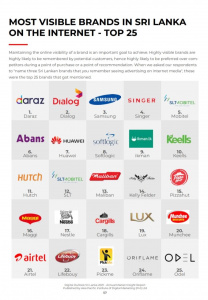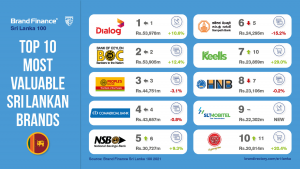Retail Marketing in the New Normal
Retail as we know it
Every industry in the world goes through monumental changes, mostly in response to a crisis or as part of their adaptation journey to be relevant in a fast-paced world. Consumers are also exposed to millions of companies that are fighting to get the consumer’s attention in the same digital space. Therefore in a volatile environment, it is of utmost importance that companies constantly mould and unmould themself to stay relevant. The decisions they take have the ability to change the entire course of the business; it can either make or break the company.
The retail industry is no different. In Sri Lanka, the traditional consumer is accustomed to visiting brick and mortar businesses for shopping purposes. However, in terms of supermarkets, this did not mean that the world of e-commerce was a novel concept. Though internet penetration in Sri Lanka is 47% as of January 2020 (We Are Social, 2020), there was little need for the consumer to adapt to digital finance or rely on e-commerce. While people were mostly aware of the overall perks of shopping online, most consumers, especially Gen X, would still choose to walk the aisles of a supermarket, choosing their favourite products, physically examining them and comparing them before making an informed decision on a purchase. For most Sri Lankans, the supermarket or grocery shopping trip was more than a chore.
Here comes the pandemic…
However, fast forward to March 2020, with the emergence of the first wave of COVID-19, even the most ardent brick and mortar consumers were forced to shift to the e-comm space. Many industries saw a major shift in consumer behaviour and attitudes, when it came to retail. Islandwide lockdowns, and restricted travelling, forced retailers to adapt to the e-comm space seemingly overnight. With the onset of the pandemic, consumers ceased to visit stores due to health and safety risks and restrictions (Mckinsey Insights, 2020). The global economic crisis led by COVID-19 massively deteriorated consumer confidence by the end of March 2020 (JKH annual report, 2020).
Keells, being one of the largest supermarkets in the country with more than 130 outlets and over 5,000 employees also had to adapt to the abrupt change in consumer behaviour and the resulting demand for online services in order to serve a newly expanded and fully dependant e-comm consumer base. With Keells being the only online supermarket among its competitors at the time, they had a competitive advantage and a key responsibility to help consumers move from a traditional brick and mortar purchasing journey to a pure online shopping experience.
How Keells geared up to face one of the biggest changes in consumer demand overnight
Keeping the strategic considerations in mind, a robust, integrated digital campaign was implemented to promote online sales, educate on safety and show appreciation to the many stakeholders. The campaign started in March 2020 and they continue to improve and provide sustainable solutions to their stakeholders in the new normal.
Since the initial demand to place online orders was overwhelmingly high, Keells started by operating via a control site, taking a limited number of orders, operating in limited locations with a limited range of essential goods. Keells was always keen to monitor and understand consumer sentiments which helped them to gradually adapt and manage consumer expectations. By moving their online platforms to Azure, Keells managed to effectively streamline their traffic to the site and improve the consumer online journey. They eventually were able to expand to a fully functional e-commerce site by mid-July 2020 with many improved site features such as real time stock availability, order tracking, utility payment platforms and many more.
Their online communication channels were constantly updated to create awareness and drive traffic. They implemented custom, geo-targeted promotions for their different categories on their website across social channels. Furthermore via complex data algorithms, Keells decoded consumer purchasing patterns to personalize their promotions to their customers. As the physical vendor kiosks in outlets were disabled due to health and safety concerns, they introduced an online gateway to pay utility bills. Once the lockdown was lifted, they reintroduced the “click and collect” option for customers who wished to not spend time in-store. Something noteworthy about Keells’ content mix was how simple and transparent they were with their comms. Since Keells understood the majority of sentiments of customers who might not be comfortable with online purchasing, Keells made it easier for them by doing a series of online walkthrough videos for customers to help them navigate their online journey with a breeze. While they humbly celebrated each milestone, they also were transparent and honest about their fallbacks, which instilled a sense of honesty for the brand among the consumers and making Keells a credible brand in the long run.


Growing slowly but steadily
Based on the learnings from the first lockdown, Keells was able to revamp their entire site in terms of design and functionality for a much more user-friendly online shopping experience. This was followed by the release of their mobile app and WhatsApp order facility later on.


Even after several lockdowns were lifted, their e-commerce site continues to cater to consumers providing home delivery and pick up.
There is no doubt that the pandemic had a detrimental effect on the consumer’s spending patterns. According to Mckinsey.com (2020), Asian consumers anticipate financial difficulties due to the pandemic and the shrinking consumer wallet sizes shift them to value-based spending. As Keells proactively understood the consumer’s reluctance to spend lavishly under the circumstance, they continued to promote an array of discounts across online and offline channels. In a price sensitive market, Keells expanded their private label product range which is 10% cheaper than competitor brands, targeting consumers looking for the best products at the best price. Their unique strengths helped them stay ahead of the competition.

Apart from implementing solutions in response to the shift in consumer behaviour to digital, there was also a need to create awareness, and show appreciation to boost the morale of their staff and inculcate an overall positive sentiment about the company in the consumer’s mind.
The ‘වගකීම campaign’ implemented post 1st lockdown, highlighted Keells as a retailer who is responsible not only for their customers’ safety but also for many other stakeholders they work with. Their story-telling videos and infographics extensively created awareness of the safety measures taken by Keells at every touchpoint of the consumer journey.


Once awareness was created, next was the need to show appreciation. Keells went on to show their deepest appreciation to their employees and the frontliners who served a nation under lockdown beyond their call of duty.The campaign named “The Hands That Serve You” included a series of emotion-driven storytelling videos and posts along with the anthem of appreciation sung by their staff to appreciate the untiring efforts of those who continued to serve the nation during the pandemic.


When numbers speak for itself
The results of the campaign spoke for themselves on its success by reaching over 2.5 MN people which is 33.78% of the total social media population in Sri Lanka and also generating over 30 MN Impressions across multiple channels. In terms of qualitative accolades, Keells was placed amongst the top 10 in the ’25 Most Visible Brands on the Internet in Sri Lanka’ by the Asia Pacific Institute of Digital Marketing. Keells also became the ‘Most Valuable Supermarket’ in both 2020 & 2021 by Brand Finance.



While the pandemic of COVID-19 has inevitably changed the course of everything we’ve known to be, especially in the corporate world, with right scenario planning, forecasting the correct probable outcomes, and most importantly being proactive and agile to the unprecedented change in consumer behaviour and demand, helped a local retail brand like Keells to turn stumbling blocks into stepping stones.

Written by Melissa Gunatilleke, Associate Lead – Account Management
References:
https://datareportal.com/reports/digital-2021-sri-lanka
https://keells.com/resource/annual-report/John_Keells_Holdings_PLC_AR_2019_20_CSE.pdf
https://brandfinance.com/wp-content/uploads/1/brand_finance_sri_lanka_100_2020_full_report.pdf

 651 Kotte Rd, Kotte,
Sri Lanka
651 Kotte Rd, Kotte,
Sri Lanka



